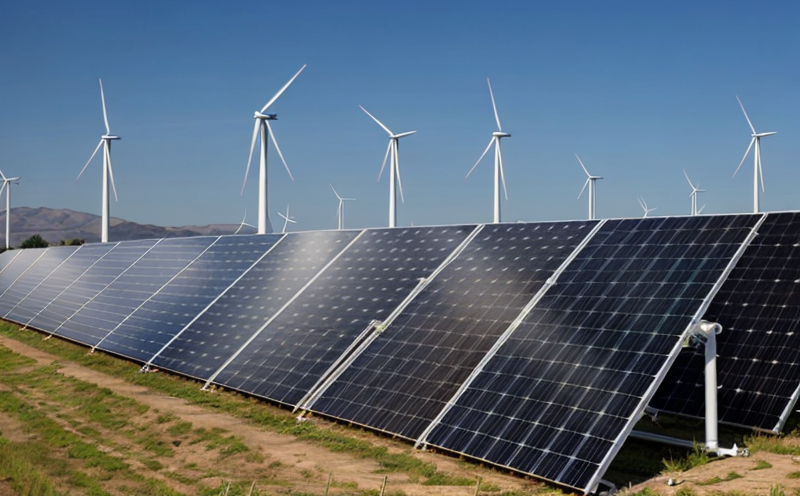EN 50160 Voltage Quality Compliance Testing in Renewable Systems
The EN 50160 standard is a critical tool for ensuring the voltage quality of renewable energy systems. This standard provides essential guidelines to ensure that electricity supplied by renewable sources meets stringent quality criteria, which are vital for both grid stability and consumer protection.
Compliance with EN 50160 is particularly crucial in the context of integrating renewable energy into power grids. The standards define the allowable deviations from nominal voltage levels during a specified time period and under defined conditions. These parameters ensure that fluctuations do not exceed safe limits, which can otherwise lead to equipment damage or operational inefficiencies.
Our laboratory specializes in providing EN 50160 testing services for renewable energy systems, ensuring adherence to these critical standards. We employ sophisticated instrumentation and rigorous testing protocols to simulate real-world conditions accurately. Our team of experts ensures that all tests are conducted under controlled environments replicating the operational scenarios faced by renewable energy systems.
The significance of EN 50160 in renewable energy cannot be overstated, especially as the sector expands globally. As more countries adopt renewable energy sources for their electricity needs, ensuring compliance with international standards like EN 50160 becomes imperative. Our laboratory supports this transition by offering comprehensive testing services that guarantee the reliability and safety of renewable systems.
Our approach to EN 50160 testing involves a multi-step process that begins with detailed consultation with our clients about their specific requirements. This phase is followed by meticulous preparation of test specimens, which includes setting up the appropriate equipment and ensuring all parameters are correctly configured according to EN 50160 specifications.
The actual testing phase is where we leverage state-of-the-art instruments capable of measuring voltage deviations with high precision. Our tests cover a range of scenarios including peak demand periods, low load conditions, and transitional states between full operation and shutdown. The data collected during these tests are then analyzed using advanced software tools to provide comprehensive reports that outline compliance status.
Our expertise extends beyond just conducting the tests; we also offer interpretation services to help our clients understand the implications of their test results. This includes providing recommendations on necessary adjustments or improvements based on our findings. By doing so, we contribute significantly towards maintaining high standards within the renewable energy sector.
- Industry Applications: Our EN 50160 testing services are widely used by various stakeholders in the renewable energy industry including manufacturers of solar panels and wind turbines, utility companies responsible for grid management, and independent power producers looking to ensure their systems meet regulatory requirements.
- Why Choose This Test: Compliance with EN 50160 not only helps avoid penalties but also enhances the reputation of your organization. It demonstrates a commitment to quality and reliability which are increasingly important as consumers become more discerning about where they source their energy from. Furthermore, successful completion of this test can open doors to new markets or contracts.
Scope and Methodology
The scope of EN 50160 covers the measurement and evaluation of voltage quality in electricity supplies. Specifically, it addresses the need for accurate assessment of deviations from nominal voltage levels over defined time periods under specified conditions. This includes short-term (3 seconds) and long-term (1 minute) excursions.
Our methodology involves several key steps designed to ensure thoroughness and accuracy. Initially, we conduct an initial site survey to understand the specific requirements and constraints of each project. Following this, detailed test plans are developed tailored specifically for the type of system being tested—whether it's solar photovoltaic (PV), wind turbine, or hybrid systems.
The actual testing process utilizes specialized equipment capable of capturing precise data points over extended durations. This ensures that all aspects of voltage stability are captured accurately. Post-test analysis involves reviewing collected data against EN 50160 specifications to determine compliance levels. Any deviations from acceptable limits identified during this phase are documented thoroughly and discussed with clients.
Reporting is an integral part of our service offering. Each report includes detailed descriptions of test procedures followed, observed results, and conclusions drawn regarding compliance status. Recommendations for necessary actions are provided where required to bring systems into full conformity with the standard.
Industry Applications
- Solar Power Systems: Ensuring that solar panels operate within specified voltage ranges helps maximize energy production efficiency while minimizing potential damage to connected devices. This is especially important given the increasing prevalence of grid-tied systems.
- Wind Turbine Farms: Properly regulated voltages are crucial for optimizing performance and extending the lifespan of wind turbines. Compliance testing ensures that these critical components function optimally under varying weather conditions.
- Hybrid Systems: Combining different types of renewable energy sources requires careful management to maintain consistent voltage levels across all parts of the system. Our tests ensure seamless integration between various components, enhancing overall reliability and efficiency.
Why Choose This Test
- Achieving Regulatory Compliance: By adhering to EN 50160 standards, organizations demonstrate their commitment to meeting regulatory requirements set forth by governing bodies.
- Enhancing Reputation: Successful completion of this test enhances an organization’s reputation among stakeholders, including customers and partners.
- Increase Market Opportunities: Compliance with international standards like EN 50160 opens up opportunities for exporting products to countries that require adherence to these norms.
- Reducing Risks: Ensuring voltage quality through testing minimizes risks associated with potential electrical hazards and equipment failures.





